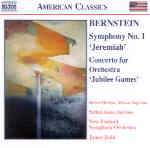Buy this disc now! Until these performances came along I thought that the future of reviewing new Bernstein releases would consist of the existential nightmare of finding perpetually different ways to say, “Well, this newcomer is certainly very good but no match for the composer’s own classic recording, blah, blah, blah…” I can’t thank Naxos, conductor James Judd, and his terrific New Zealanders enough for dispelling this fear once and for all. These performances not only match Bernstein’s in idiomatic flair, rhythmic zest, and sheer spunk, they often surpass them, and believe me I spent a lot of time comparing recordings before going out on this particular limb.
In the Jeremiah Symphony Judd catches the bluesy menace of the first-movement “Prophecy” as well as Bernstein does in his justly celebrated New York Philharmonic recording for Sony, and he drives the second-movement “Profanation” even harder, but with an absolutely scorching approach to accents and syncopations and a tremendous virtuoso response from the players. The rhythmic precision and confidence the orchestra reveals at these tempos is little short of shocking, and it perfectly realizes the music’s embodiment of a sort of “Bar Mitzvah in Hell”. In the final “Lamentation” mezzo-soprano Helen Medlyn even evokes memories of Bernstein’s Jennie Tourel, her intonation of the Hebrew text tellingly capturing its sorrow and bitterness, the voice not necessarily “pretty” in the conventional sense but just right in this context.
Bernstein’s Concerto for Orchestra “Jubilee Games” was his final major orchestral work, and it remains one of his least-recorded. With little performance tradition to speak of, this 100 percent committed rendition goes further than Bernstein’s own DG issue in establishing the piece both as a major statement and as a synthesis of Bernstein’s career as a symphonic composer. Judd and his players tear into the opening “Free-Style Events” like a crowd on a rampage and offer some delicious solo turns in the succeeding “Mixed Doubles”. Judd knocks about half a minute off of Bernstein’s own timing for the “Diaspora Dances”, revealing perhaps what the great man himself would have done earlier in his career–and correctly so, for this is youthful music very much in the style of the Jeremiah Symphony’s second movement. In the closing Benediction, Judd finds exactly the same degree of solemn repose when compared to Bernstein, with baritone Nathan Gunn offering a gently moving final prayer.
The recorded sound is as impressive technically as the performances are artistically. Very clear but not so much as to preclude the necessary warmth, and superbly well balanced, the engineering permits you to hear more of Bernstein’s colorful orchestration than do any of his own renditions. The tangy low sonorities of bass clarinet and contrabassoon in “Jeremiah” make telling contributions here, and in the big climaxes you can really discern each instrumental section’s contribution to the general frenzy. I can’t overestimate the importance of this recording: Judd has triumphantly exorcised the ghost of Bernstein the conductor of classic recordings to the greater glory of Bernstein the composer of classical music. Nothing would have made him happier.
































